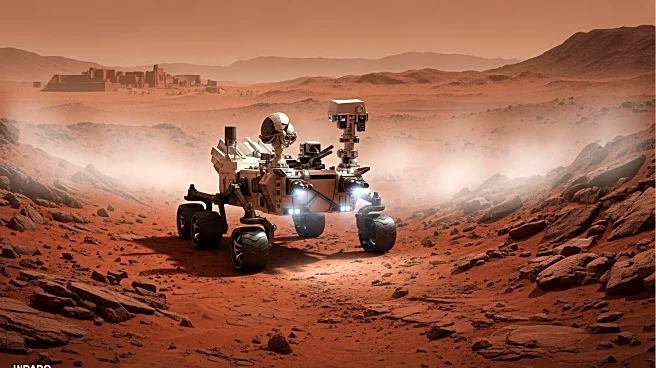What's Happening?
NASA's Perseverance rover has made a significant discovery on Mars, uncovering mysterious markings rich in chemicals essential for life. The rover, exploring the Neretva Vallis, a river-carved valley that once fed an ancient Martian lake, found an intriguing arrowhead-shaped rock named Cheyava Falls. The rock's surface was marked with black 'poppy seeds' and faint 'leopard spots.' Upon examination, scientists found these markings contained organic carbon, iron, phosphorus, and sulfur, all key chemicals for sustaining life. Additionally, the presence of two rare minerals, vivianite and greigite, was detected. These minerals form through redox reactions, similar to those behind photosynthesis and respiration on Earth. This discovery has reignited hopes that Mars may have once harbored complex chemistry akin to that which made life possible on Earth.
Why It's Important?
The discovery by NASA's Perseverance rover is crucial as it provides indirect evidence that Mars may have once supported life. The presence of redox chemistry, which is essential for life on Earth, suggests that similar processes could have sustained life on Mars. This finding fuels ongoing debates about the potential for life beyond Earth and the history of Mars as a habitable planet. The implications are significant for astrobiology and the search for extraterrestrial life, as it suggests that the conditions necessary for life might not be unique to Earth. This could lead to a broader understanding of life's potential existence elsewhere in the universe.
What's Next?
The discovery is likely to prompt further exploration and study of the Martian surface to gather more evidence of past life. NASA and other space agencies may prioritize missions to areas with similar geological features to Cheyava Falls. The scientific community will continue to analyze the data collected by Perseverance to understand the implications of these findings better. Future missions may focus on returning samples to Earth for more detailed analysis, which could provide more definitive evidence of past life on Mars.
Beyond the Headlines
The discovery also raises ethical and philosophical questions about humanity's role in exploring and potentially colonizing other planets. If Mars once harbored life, it challenges the notion of Earth as the sole cradle of life in the universe. This could lead to discussions about the preservation of potential Martian ecosystems and the ethical considerations of human intervention on Mars. The findings may also influence future space policy and international cooperation in space exploration.











